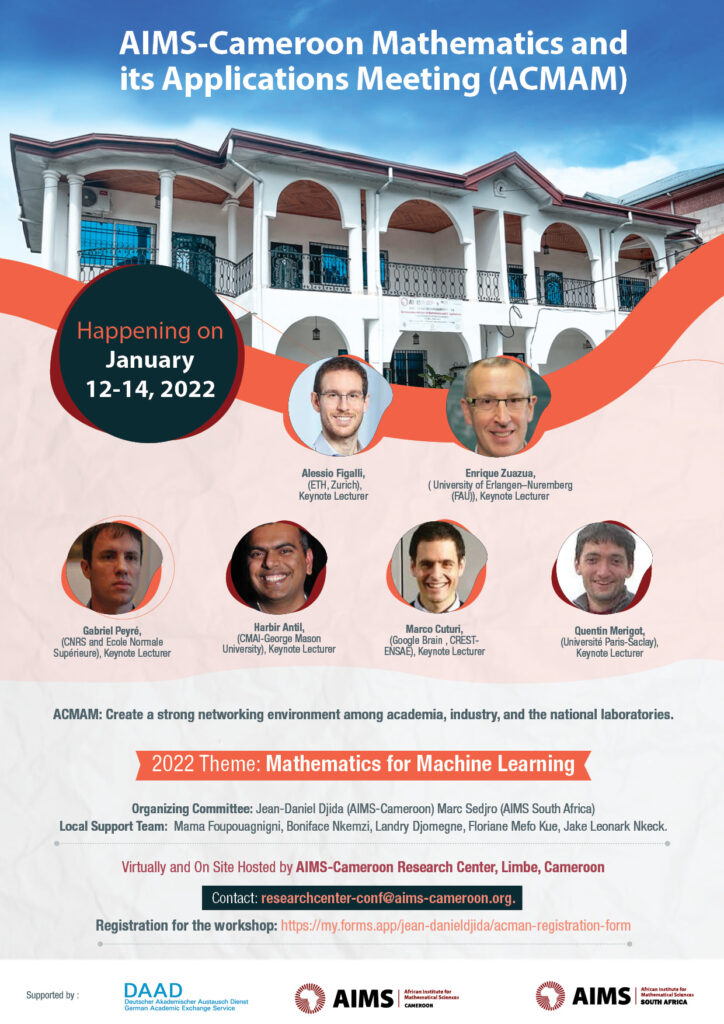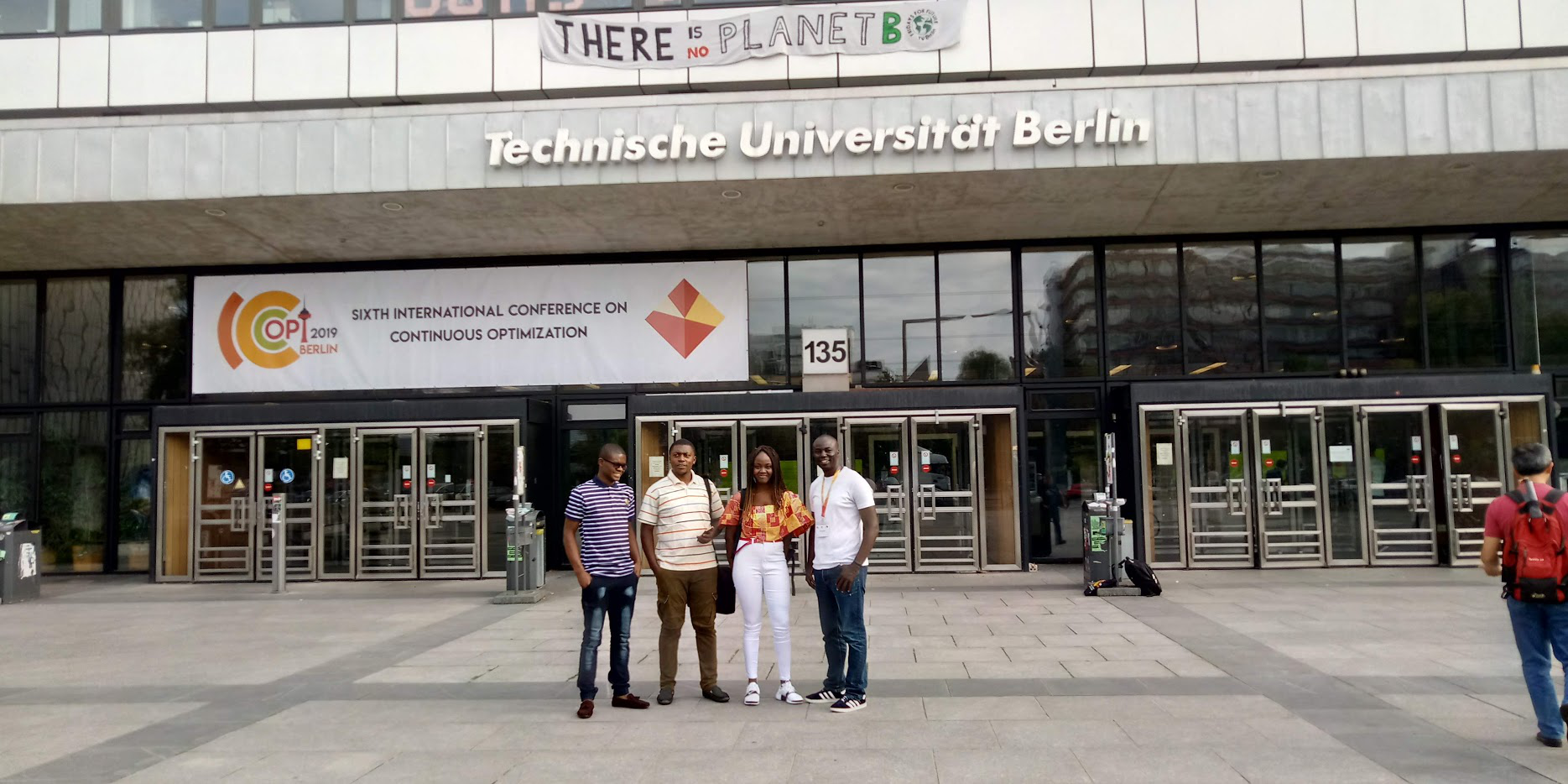Forthcoming Workshop
AIMS -Cameroon Mathematics and its Applications Meeting (ACMAM) Holds in January 2022
AIMS Cameroon Research Center will organize the maiden edition of its annual scientific event named AIMS-Cameroon Mathematics and its Applications Meeting (ACMAM) from the 12th to the 14th of January, 2022. Lectures take place at the AIMS Cameroon Research Center in Limbe South West Region.
The AIMS-Cameroon Mathematics and its Applications Meeting (ACMAM) is an initiative to introduce students and early-career researchers to the current trends in Mathematics and its application in Data sciences as well as to create a strong networking environment among academia, industry, and the national laboratories. This hybrid (face-to-face and online) workshop will be held annually under the title “AIMS-Cameroon Mathematics and its Applications Meeting” (ACMAM) and will see three distinguished speakers give lectures on their research topics.

The focus of the first ACMAM will be on Fundamental Sciences (Mathematics) and its applications to Data Sciences. Researchers from all Mathematics and its Applications areas will be encouraged to participate.
The meeting will comprise mini-courses targeted toward students and early career researchers as well as Public Lectures. There will be other talks and contributions by guest speakers.
DESCRIPTION
This workshop will introduce students and early-career researchers to the current trends in Mathematics ( Optimization, Optimal transport, PDEs, Calculus of variations, Mean Field Games, and Optimal control) and its Applications, specifically to the fields of Data Sciences (Machine learning, Neural Network etc.), and will lay out various research interests in the field. It also aimed to create a strong networking environment among academia, industry, and national laboratories.
The extensive successful use of machine learning, Digital twin, Deep learning, Neural networks in communications and information theory, and Climate Sciences in recent years has been remarkable. However, from a mathematical viewpoint, an adequate theoretical understanding of its primary governing principles is still missing in many situations.
For example, a new continuous viewpoint of artificial neural networks has recently risen, intending to enlighten computing systems’ understanding. As noticed by Fernandez Real and Alessio Figalli in their survey (https://sma.epfl.ch/~xafernan/Documents/Fernandez-Real_Figalli_Flows_Survey.pdf ), this theoretical approach has already been developed and shown noticeable and consists in viewing the gradient descent used to optimize parameters in a neural network as a gradient flow in the Wasserstein distance for their empirical measure.
Most of this study has been conducted from a modeling and numerical point of view. There are still many open questions that are also interesting from a purely theoretical perspective. In this framework, new mathematical problems and PDE systems have arisen, which have not yet been fully adopted by the mathematical community.
The Workshop (meeting) aims to discuss this relation, focusing on the associated theoretical aspects appealing to the mathematical community, raising awareness to young researchers, Ph.D. and Masters’s students, and providing a list of interesting open problems related to industry and flourishing local companies.
However, mathematical theory supporting the most work in Machine learning is missing, and mathematicians are starting to consider this challenging problem of significant importance. The Workshop aims to introduce participants to some of the mathematical foundations of data science in general and Machine Learning in particular. By the end of this annual meeting, participants would be sufficiently armed with the mathematical tools and techniques to potentially undertake theoretical research in Mathematics and its applications in Machine Learning.
Target Audience
Researchers, Postdocs, Ph.D., and Master’s students.
Keynote Speakers
- Harbir Antil (CMAI-George Mason University, USA)
- Alessio Figalli (ETH, Zurich)
- Enrique Zuazua (FAU, Germany)
- Gabriel Peyré (CNRS and Ecole Normale Supérieure, France )
- Marco Cuturi (Google Brain / CREST-ENSAE)
- Quentin Merigot (Université Paris-Saclay)
Guest Speakers
- Mahamadi Warma (CMAI-George Mason University, USA)
- Franca Hoffmann (Aims-Rwanda, Rwanda)
- Marc Sedjro (Aims-South Africa, South Africa)
- Ralph Chill (Technische Universität Dresden, Germany)
- Olivier Menoukeu Pamen (University of Liverpool, UK)
- Mouhamed Moustapha Fall (AIMS-Senegal, Senegal)
Contribution Talks
- Speaker 1 (see Marc Sedjro)
- Speaker 2 (see Marc Sedjro)
Organizing Committee
- Jean-Daniel Djida (Aims-Cameroon, Cameroon)
- Marc Sedjro (Aims-South Africa, South Africa)
Local Support Team: Mama Foupouagnigni, Boniface Nkemzi, Landry Djomegne, Floriane Mefo Kue, Jake Leonark Nkeck.
Schedule: Click Here Scientific Program: Click Here
Registration
- Registration is mandatory. Please register Here.
- Travel support is available for students and early researchers. Details can be found Here.
- Questions and concerns should be addressed to Jean-Daniel Djida at researchcenter-conf [at] aims-cameroon.org
- Please note: Travel funding is limited and applicants are required to seek alternative sources of funding.
Support

Colloquiums
We usually meet (with a few exceptions, please see below) on Tuesday at 5:00 pm (West African Time). If you are interested in joining, please fill out the Registration Form. For questions please contact Dr. Jean-Daniel Djida (jeandaniel.djida@aims-cameroon.org).
Past and Forthcoming Colloquiums
| DATE | SPEAKER | AFFILIATION | TITLE and ABSTRACT | FILES |
| December 14, 2021 | Mouhamed Moustapha Fall | Aims-Senegal, Senegal | TBA | |
| December 07, 2021 | Mary Vaughan | University of Texas, Austin, USA | Harnack inequality for fractional elliptic equations in nondivergence form | |
| November 30, 2021 | Luciano Abadias Ullod | Universidad de Zaragoza, Spain | Discrete Hölder spaces and their characterization via semigroups associated to the discrete Laplacian | |
| November 23, 2021 | TBA | TBA | TBA | |
| November 16, 2021 | Connor Mooney | University of California, Davis, USA | Solutions to the Monge-Ampere equation with polyhedral and Y -shaped singularities | |
| November 09, 2021 | Enrico Valdinoci | University of Western Australia, Australia | The stickiness property of nonlocal minimal surfaces | |
| November 02, 2021 | Xavier Fernandez Real | EPFL Lausanne, Switzerland | Generic Regularity in the Fractional Obstacle Problem | SLIDES |
| October 26, 2021 | Alejandro J. Castro Castilla | University of Nazarbayev, Kazahstan | Well-posedness of Non-Linear Partial Differential Equations in Weighted Sobolev Spaces | SLIDES |
| October 19, 2021 | Maria Sorria-Carro | University of Texas, Austin, USA | Regularity for C^{1,\alpha} interface transmission problems | SLIDES |
| October 12, 2021 | Animesh Biswa | University of Nebraska-Lincoln, USA | Regularity Estimate for nonlocal space-time master equations | SLIDES |
| October 5, 2021 | Alexis Vasseur | University of Texas, Austin, USA | Instability of finite time blow-up for incompressible Euler | SLIDES |
| September 24, 2021 | Virginia Naibo | Kansas State University, USA | Boundedness Properties for Hermite Pseudo-multipliers | SLIDES |
| September 21, 2021 | Mark Allen | Brigham Young University, USA | Sharp Quantitative Faber-Krahn inequalities and the Alt-Caffarelli-Fredman Monotonicity Formula | SLIDES |
| Wednesday, March 31, 2021 | Guy Fabrice Foghem Gounoue | Technische Universität Dresden, Germany | Nonlocal characterization of Sobolev spaces and convergence of solutions to elliptic Integrodiferential Equations | Video Slides |
| Wednesday, February 24, 2021 | Pablo Raúl Stinga | Iowa State University, USA | Nonlocal fractional Monge–Ampère equations | Video Slides |
| Friday, January 15, 2021 | Ralph Chill | Technische Universitat Dresden, Germany | Degenerate Gradient Systems: The Bidomain Problem and Dirichlet-to-Neumann Operators | Video Slides |
| Tuesday, October 13, 2020 | Mahamadi Warma | George Mason University, USA | Controllability of Space-Time Fractional Diffusive and Super Diffusive Equation | Slides |
| Tuesday, September 22,2020 | Harbir Antil | George Mason University, USA | Optimal Control and Deep Learning with Fractional Operators | Video |
| Tuesday, September 01,2020 | Ivan Area | Universidad de Vigo, Spain | Mathematical Modeling of COVID-19 Transmission Dynamics | Slides |
| Tuesday, August 18, 2020 | Arran Fernandez | Eastern Mediterranean University, Northern Cyprus | Fractional Calculus and Zeta Functions | Video Slides Interview |

